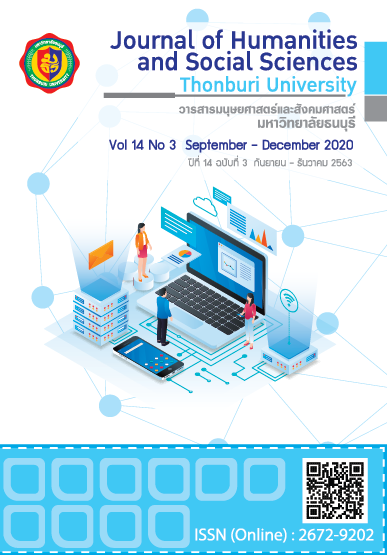The Priority Needs of Private Elementary School Academic Management Based on The Concept of Quality Citizen Attributes in 21st Century
Keywords:
Academic management, Private School, quality citizen attributes, 21st centuryAbstract
Abstract
This research was conducted by using the survey research which supported by “The 90th Anniversary of Chulalongkorn University Fund” Ratchadaphiseksomphot Endowment Fund Batch #45. The objective of this research was to analyze the priority needs of private elementary school academic management based on the concept of quality citizen attributes in 21st century. The sample groups were private elementary schools chosen by multi-stage random sampling. The research instrument used in this study was the 5-level rating scale questionnaire. The data was analyzed by frequency distribution, percentage, mean, standard deviation, and Modified Priority Needs Index (PNImodified). The results of the priority needs ranking were as follows: the highest of priority need was the defining desirable attributes. Next was the learning and teaching of 8 subject groups. The lowest of priority need was the defining the purpose of curriculum. When considering each aspect of the quality citizen attributes, it was found that the highest priority need was the attributes of digital citizenship. Next was the attributes of global citizenship. The lowest of priority need was the attributes of the good citizenship.
Keywords: Academic management, Private School, quality citizen attributes, 21st century
References
กระทรวงศึกษาธิการ. (2551). หลักสูตรแกนกลางการศึกษาขั้นพื้นฐาน พุทธศักราช 2551. กรุงเทพฯ: โรงพิมพ์ชุมชนสหกรณ์การเกษตรแห่งประเทศไทย จำกัด.
กระทรวงศึกษาธิการ. (2554). แนวทางการพัฒนาการวัดและประเมินคุณลักษณะอันพึงประสงค์: ตามหลักสูตรแกนกลางการศึกษาขั้นพื้นฐาน พุทธศักราช 2551. กรุงเทพฯ: โรงพิมพ์ชุมชนสหกรณ์การเกษตรแห่งประเทศไทย จำกัด.
เครือข่ายการศึกษาเพื่อสร้างความเป็นพลเมืองในระบอบประชาธิปไตย. (2556). กรอบแนวคิดหลักสูตร การศึกษาเพื่อสร้างความเป็นพลเมืองในระบอบประชาธิปไตย. กรุงเทพฯ: เทคนิคอิมเมจ.
ปริญญา เทวานฤมิตรกุล. (2555). การศึกษาเพื่อสร้างพลเมือง. กรุงเทพฯ: นานมีบุ๊คส์.
ไพฑูรย์ สินลารัตน์. (2559). การศึกษาไทย 4.0 เป็นยิ่งกว่าการศึกษา. พิมพ์ครั้งที่ 2. กรุงเทพฯ: มหาวิทยาลัยธุรกิจบัณฑิตย์.
มติชนออนไลน์. (2562). ‘รมช.ศธ.’ เดินหน้าหลักสูตร ‘โค้ดดิ้ง’ หนุนเด็กไทยเรียนภาษาที่ 3 พร้อมก้าวสู่ศตวรรษที่ 21. สืบค้นเมื่อ 24 กุมภาพันธ์ 2563, จาก https://www.matichon.co.th/education/news_1619020
วรพจน์ วงศ์กิจรุ่งเรือง. (2561). คู่มือพลเมืองดิจิทัล. กรุงเทพฯ: สำนักงานส่งเสริมเศรษฐกิจดิจิทัล กระทรวงดิจิทัลเพื่อเศรษฐกิจและสังคม.
สถาบันระหว่างประเทศเพื่อการค้าและพัฒนา. (2561). นโยบายและกลยุทธ์การพัฒนาเยาวชนตามกรอบนโยบายความเป็นผู้ประกอบการของ UNCTAD. สืบค้นเมื่อ 25 กุมภาพันธ์ 2563, จาก http://www.itd.or.th/wp-content/ uploads/2018/09/Policy-Brief-61_Youth2.pdf
สำนักงานคณะกรรมการพิเศษเพื่อประสานงานโครงการอันเนื่องมาจากพระราชดำริ (สำนักงาน กปร.). (2559). ชุดเผยแพร่องค์ความรู้ตามแนวพระราชดำริ 2: เศรษฐกิจพอเพียง. กรุงเทพฯ: สำนักงานคณะกรรมการพิเศษเพื่อประสานงานโครงการอันเนื่องมาจากพระราชดำริ.
สำนักงานเลขาธิการสภาการศึกษา. (2557). การประชุมสัมมนาทางวิชาการระหว่างประเทศ ประจำปี 2557 ของสำนักงานเลขาธิการสภาการศึกษา เรื่อง “การศึกษาไทยในโลกศตวรรษที่ 21”. กรุงเทพฯ: สำนักงานเลขาธิการสภาการศึกษา.
สุวิมล ว่องวาณิช. (2558). การวิจัยประเมินความต้องการจำเป็น. กรุงเทพฯ: สำนักพิมพ์จุฬาลงกรณ์มหาวิทยาลัย.
Cogan, J., & Derricott, R. (1998). Citizenship education for the 21st century: An International Perspective on Education. London: Kogan Page.
DQ Institute. (2018). Outsmart the Cyber-Pandemic: Empower Every Child with Digital Intelligence by 2020. Retrieved January 23, 2020, from https://www.dqinstitute.org/2018dq_impact_report/
DQ Institute. (2019). Digital Intelligence (DQ) Framework. Retrieved January 23, 2020, from https://www. dqinstitute.org/wp-content/uploads/2019/03/DQGlobalStandardsReport2019.pdf
Oxfam. (2015). Education for global citizenship: A guide for schools. Retrieved August 20, 2019, from https://www. oxfam.org.uk/education/resources/education-for-global-citizenship-a-guide-for-schools
Yamane, T. (1973). Statistics: An Introductory Analysis. New York: Harper and Row Publication.
Translated Thai References
International Institute for Trade and Development. (2018). Youth development policies and strategies in accordance with the UNCTAD Entrepreneurship Policy Framework. Retrieved February 25, 2020, from http://www.itd. or.th/wp-content/uploads/2018/09/Policy-Brief-61_Youth2.pdf (in Thai)
Matichon Online. (2019). ‘Deputy Minister of Education’ Progress course ‘Coding’ Support Thai children to learn language 3 and move towards the 21st century. Retrieved February 24, 2020, from https://www. matichon.co.th/education/news_1619020 (in Thai)
Ministry of Education. (2008). Basic Education Core Curriculum B.E. 2551 (A.D. 2008). Bangkok: The Agricultural Cooperative Federation of Thailand. Limited. (in Thai)
Ministry of Education. (2011). Guidelines for development, measurement and evaluation of desirable characteristics: following Basic Education Core Curriculum B.E. 2551 (A.D. 2008). Bangkok: The Agricultural Cooperative Federation of Thailand. Limited. (in Thai)
Office of the Education Council. (2014). International Academic Seminar Year 2014 of the Office of the Education Council “Thai education in the 21st century world”. Bangkok: Office of the Education Council. (in Thai)
Office of the Royal Development Project Board (ORDPB). (2016). Knowledge dissemination according to the royal initiative 2: Sufficiency Economy. Bangkok: Office of the Royal Development Project Board. (in Thai)
Sinlarat, Paitoon. (2016). Thai education 4.0 is more than education. 2nded. Bangkok: Dhurakij Pundit University. (in Thai)
Thaewanarumitkul, Prinya. (2012). Civic Education. Bangkok: Nanmeebooks. (in Thai)
Thai Civic Education. (2013). Conceptual framework for Thai Democratic Citizenship Education Curriculum. Bangkok: Imagetechnic. (in Thai)
Wongkitrungruang, Worapoj. (2018). Digital Citizen Guide. Bangkok: Digital Economy Promotion Agency, Ministry of Digital Economy and Society. (in Thai)
Wongwanich, Suwimon. (2015). Needs assessment research. Bangkok: Chulalongkorn University Press. (in Thai)







